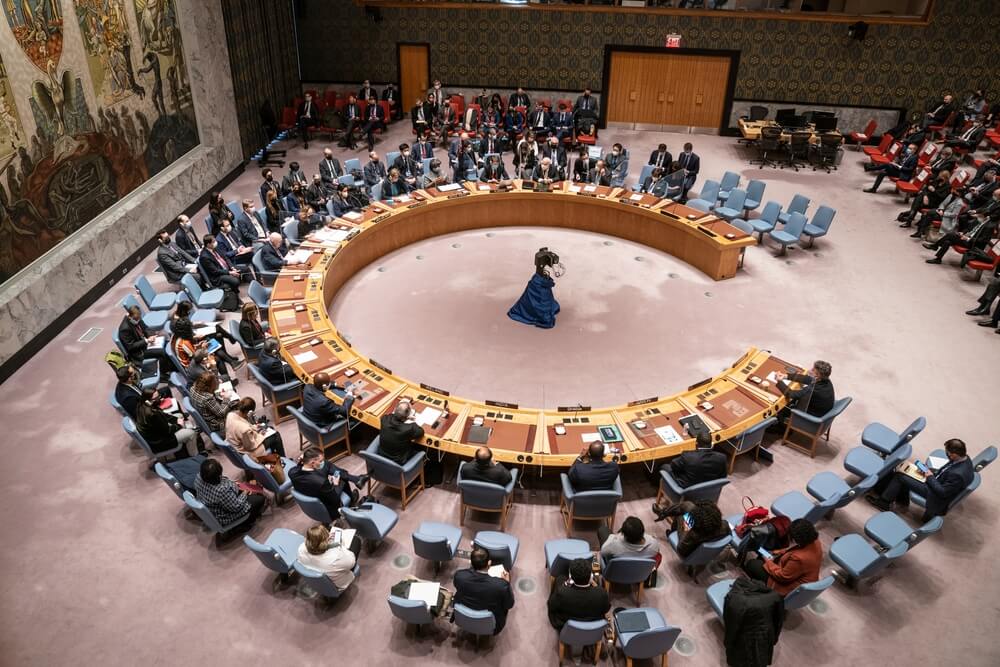Imagine the UK ceding its permanent seat on the UN Security Council to India. This was the thought experiment raised recently by Kishore Mahbubani, Singaporean diplomat and former president of the Security Council.
He said that if the UK were to make such a radical, albeit very unlikely, move, little would change in reality because it had in effect relinquished its veto by ceasing to take any position independent of the US. “The unipolar world is over; a new multipolar world is emerging. British sagacity can help the Americans transition to this different world,” Mahbubani wrote in the Financial Times.
India and the Africa Union are lobbying intensely for UN reform ahead of next month’s “Summit of the Future”, a special UN meeting at which the UN hopes all member countries will agree “multilateral solutions for a better tomorrow” to tackle crises from climate change to inequality.
Cynics will say little has changed to foster international co-operation or even worsened with the growth of nationalism around the world since Madeleine Albright, the late former US secretary of state, said more than a decade ago: “I know people think multilateralism is a terrible word because it has too many syllables and ends in an ‘ism’ but at the end of the day, it just means partnership.”
Historical injustices were invoked by UN chief António Guterres earlier this month when he said Africa should be given a permanent seat at the UN Security Council, which at present is often deadlocked with Russia and China set against the US, France and UK. These five permanent members have veto power while the remaining 10 non-permanent seats are allocated regionally.
Africa in the UN
Reform of the Security Council has been urged almost since the Big Five powers fresh from victory in World War II signed the UN Charter in San Francisco in 1945. Any big reform would require their unanimity to amend the charter.
“We cannot accept that the world’s preeminent peace and security body lacks a permanent voice for a continent of well over a billion people - a young and rapidly growing population - making up 28% of the membership of the United Nations,” said Guterres talking about Africa.
Following a push by the global south to win greater representation at the highest reaches of the UN, there is now great power backing for Africa, according to Guterres, but it remains unknown when and how this might happen.
The African Union wants to choose which countries would take up what it hopes would be two permanent seats at the Security Council
The African Union wants to choose which countries would take up what it hopes would be two permanent seats at the Security Council and two additional non-permanent seats but it has failed to specify which countries. Choosing them would come amid tough competition among regional heavyweights including South Africa, Egypt, Ethiopia and Kenya.
Turkish President Recep Tayyip Erdoğan, meanwhile, threw his support behind Africa earlier this month, saying: “The African continent and all our African brothers must be given the opportunity to contribute to this fair system.”
India’s bid
India’s bid for a permanent seat has received backing from tech entrepreneur Elon Musk, who rarely misses an opportunity to insert himself into debate. He said earlier this year that India’s lack of a permanent seat was “absurd”.
Soon after, a US State Department spokesperson said the US supported reform “to make it more reflective of the 21st century world” but had no “specifics” to offer.
Any expansion of the Security Council could mean a corollary rise in members’ use of veto power
Russia announced in July that it supported India’s bid for a permanent seat as well as those of Brazil and the African group because Western countries were “over-represented” at the UN.
Any expansion of the Security Council could mean a corollary rise in members’ use of veto power. Currently, Russia uses the veto more than any other P5 countries while neither the UK nor France have used it since the dissolution of the USSR in 1991.
As the Council on Foreign Relations points out, aspirant members including India, Germany and Brazil have usually been against military interventions as violations of sovereignty, potentially making it even harder to uphold international humanitarian law in conflicts such as Ukraine or Gaza.
A safety valve
Any new Security Council members might not be any more keen than the current P5 to uphold, for example, the Responsibility to Protect, which was adopted by the UN General Assembly in 2005.
Under this principle, states have a responsibility to protect populations from crimes against humanity and, more controversially, use coercive measures as part of the “international community” when a state “manifestly fails” to uphold its responsibilities.
 The Security Council could still shakily continue for some time to oversee limited mediation and peace operations
The Security Council could still shakily continue for some time to oversee limited mediation and peace operations
In 2022, the General Assembly adopted the “veto initiative” under which whenever a veto is cast in the Security Council, the assembly debates the situation. But this has not stopped the US, for example, repeatedly vetoing any resolutions on Gaza.
The status of the P5’s two European members is being increasingly questioned in the wake of the Brexit vote, with calls for France to cede its permanent seat to the European Union and others wondering what the UK is still doing there.
But the Security Council managed to stagger through the Cold War and could still shakily continue for some time to oversee, for example, limited mediation and peace operations, says the International Crisis Group.
“The P5 – and above all the US, China and Russia – have a choice. They can use the Security Council solely as a stage for political theatre or preserve it as a safety valve that they can use, albeit intermittently, in a period of high tensions,” it says. “We do not know which they will choose.”